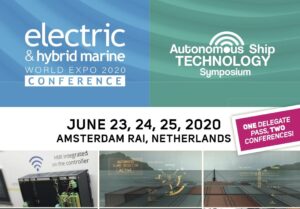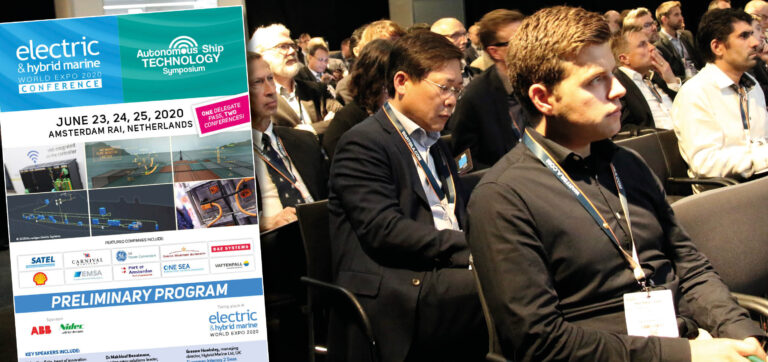The world’s leading international event for electric and hybrid marine technology has revealed its preliminary program for the 2020 conference. Electric & Hybrid Marine World Expo and Conference will be held June 23, 24, 25, 2020 at the Amsterdam RAI, the Netherlands, and will once again provide an exceptional opportunity to see industry leaders share their innovations, knowledge and insights through a comprehensive and diverse range of conferences and panel discussions. Highlights include:
 Dr Makhlouf Benatmane, Marine navy solutions leader, GE Power Conversion will discuss the HMS Queen Elizabeth aircraft carrier (QNLZ), the first aircraft carrier in the world to utilize integrated full electric power and propulsion system IFEP. It presented a step change in size and complexity. This presentation will present the merits of IFEP, QNLZ large equipment descriptions, methods and processes adopted from early design phases, through testing and trials undertaken to ensure all equipment is set to work in a safe and efficient manner to gain acceptance and deliver the required capability to the Royal Navy.
Dr Makhlouf Benatmane, Marine navy solutions leader, GE Power Conversion will discuss the HMS Queen Elizabeth aircraft carrier (QNLZ), the first aircraft carrier in the world to utilize integrated full electric power and propulsion system IFEP. It presented a step change in size and complexity. This presentation will present the merits of IFEP, QNLZ large equipment descriptions, methods and processes adopted from early design phases, through testing and trials undertaken to ensure all equipment is set to work in a safe and efficient manner to gain acceptance and deliver the required capability to the Royal Navy.
 A before-and-after emissions study of an electrified fishing boat will be explained by Dr Sue Molloy, president of Glas Ocean Electric. The company worked with Transport Canada, SPBES, Canadian Maritime Engineering and others to complete a study on the impact of electrifying a fishing boat on air emissions, noise emissions and power use in normal operation. The boat was converted to Transport Canada Safety’s highest standards and the results are representative of a ‘typical’ day-tripping fishing boat in Atlantic Canada. The presentation will include discussion of the dramatic drop in hydrocarbon emissions and underwater noise as well as detailing the process for converting a boat to these standards.
A before-and-after emissions study of an electrified fishing boat will be explained by Dr Sue Molloy, president of Glas Ocean Electric. The company worked with Transport Canada, SPBES, Canadian Maritime Engineering and others to complete a study on the impact of electrifying a fishing boat on air emissions, noise emissions and power use in normal operation. The boat was converted to Transport Canada Safety’s highest standards and the results are representative of a ‘typical’ day-tripping fishing boat in Atlantic Canada. The presentation will include discussion of the dramatic drop in hydrocarbon emissions and underwater noise as well as detailing the process for converting a boat to these standards.
 Lukas Kistner, a researcher at Institute for Electrical Energy Systems, Leibniz Universität Hannover, will describe a decentralized ship energy system with fuel cells and energy storage. Ship energy systems with higher efficiency and fewer pollutant emissions are vital to meet upcoming stricter climate protection targets. Therefore, Kistner’s talk will focus on a decentralized approach for the electric power supply, containing modular fuel cells (SOFC) with LNG reformer plants and hybrid energy storage composed of Li-ion batteries and supercapacitors. The economically optimal dimensioning and positioning of the aggregates is conducted and compared regarding three different levels of detail and presented for a real-life case study, taking into account a highly dynamic energy demand while fulfilling voltage quality requirements and smooth operation of the fuel cells.
Lukas Kistner, a researcher at Institute for Electrical Energy Systems, Leibniz Universität Hannover, will describe a decentralized ship energy system with fuel cells and energy storage. Ship energy systems with higher efficiency and fewer pollutant emissions are vital to meet upcoming stricter climate protection targets. Therefore, Kistner’s talk will focus on a decentralized approach for the electric power supply, containing modular fuel cells (SOFC) with LNG reformer plants and hybrid energy storage composed of Li-ion batteries and supercapacitors. The economically optimal dimensioning and positioning of the aggregates is conducted and compared regarding three different levels of detail and presented for a real-life case study, taking into account a highly dynamic energy demand while fulfilling voltage quality requirements and smooth operation of the fuel cells.
A panel discussion asks: Will hydrogen become a must-have marine fuel? Join Fokke van der Veen, director of operations at Future Proof Shipping; Madadh MacLaine, CEO of Zero Emissions Maritime Technology; and Allan Grant, executive vice president of Lavle for a discussion of hydrogen-energy technologies. The technologies are maturing thanks to road transportation applications and have reached a first level of cost competitiveness, qualifying them for demonstration projects in waterborne applications. If their intrinsic limitations (e.g. energy density) cast doubts on their ability to constitute a radical alternative to existing fuels, the question of the precise role they could play in the sector is at stake. This role is also likely to be influenced by local characteristics and tax regulations. Through the experience of MARANDA and Flagships, this discussion will offer a few insights to guide those considering hydrogen and fuel cells for investment.
 Don’t miss manager of innovation Jan Egbertsen from Port of Amsterdam talk about alternative fuels for shipping. His presentation will discuss two international projects that Port of Amsterdam is involved in: use of green maritime methanol and use of H2 as a clean shipping fuel. It will outline the challenges faced in these two projects regarding the development of ships, and also the development of supply chain and bunkering facilities in seaports.
Don’t miss manager of innovation Jan Egbertsen from Port of Amsterdam talk about alternative fuels for shipping. His presentation will discuss two international projects that Port of Amsterdam is involved in: use of green maritime methanol and use of H2 as a clean shipping fuel. It will outline the challenges faced in these two projects regarding the development of ships, and also the development of supply chain and bunkering facilities in seaports.
 Interested in European Interreg 2 Seas project – Implementation of Ship HYbridization (ISHY)? This ambitious €16m project has 15 partners consisting of universities and companies active in hybridization. Hear Graeme Hawksley, managing director of Hybrid Marine, describe this project, which has an aim of developing tools and business models for the implementation of hybrid and hydrogen fuel cell technologies in vessels and ports. Four vessels will be fitted with hybrid/hydrogen technologies and an H2 bunkering station for vessels will be built at the port of Ostend. Now at the midway point, in the summer of 2020, this presentation will provide an update on progress so far. Challenges encountered will be presented together with a discussion on the next stages of the project.
Interested in European Interreg 2 Seas project – Implementation of Ship HYbridization (ISHY)? This ambitious €16m project has 15 partners consisting of universities and companies active in hybridization. Hear Graeme Hawksley, managing director of Hybrid Marine, describe this project, which has an aim of developing tools and business models for the implementation of hybrid and hydrogen fuel cell technologies in vessels and ports. Four vessels will be fitted with hybrid/hydrogen technologies and an H2 bunkering station for vessels will be built at the port of Ostend. Now at the midway point, in the summer of 2020, this presentation will provide an update on progress so far. Challenges encountered will be presented together with a discussion on the next stages of the project.
From TU Delft comes associate professor Dr Henk Polinder and post-doctoral researcher Udai Shipurkar to present on the implementation of ship hybridization to optimize propulsion systems. The focus of this presentation is the development of a methodology/tool to choose the powertrain components of optimum power rating and technology for a hybrid vessel in order to reduce its CO2 emissions. This development is taking place as part of the European project ISHY. The speakers propose a multi-level optimization structure with three distinct design levels – determining the topology, determining the component technology and dimensioning, and designing the control algorithm. It also highlights the challenges and opportunities for such an optimization tool.
 Paul Simavari, development manager, hybrid marine Europe, BAE Systems, will talk about selecting power and propulsion solutions through application data analysis. Data analysis of the specific application is key to selecting the right equipment for an electric hybrid vessel regardless of the power node or hybrid elements. Data analysis ensures the longest-possible ESS life, system capability for providing power during charge and operation, and delivers on system expectations for propulsion power and auxiliary loadings both in full EV mode and hybrid operations. Data analysis sets up the power and propulsion solutions vessel personality to make sure that it operates in the most efficient state regardless of demands. This presentation will demonstrate the advantages of data analysis for product selection.
Paul Simavari, development manager, hybrid marine Europe, BAE Systems, will talk about selecting power and propulsion solutions through application data analysis. Data analysis of the specific application is key to selecting the right equipment for an electric hybrid vessel regardless of the power node or hybrid elements. Data analysis ensures the longest-possible ESS life, system capability for providing power during charge and operation, and delivers on system expectations for propulsion power and auxiliary loadings both in full EV mode and hybrid operations. Data analysis sets up the power and propulsion solutions vessel personality to make sure that it operates in the most efficient state regardless of demands. This presentation will demonstrate the advantages of data analysis for product selection.
 The conference (rates apply) takes place June 23, 24 and 25, 2020, alongside the free-to-attend Electric & Hybrid Marine World Expo, which will see over 150 exhibitors showcase the latest electric and hybrid marine charging and propulsion technologies, components and solutions. Book your pass for the world’s only international conference exclusively dedicated to electric and hybrid marine propulsion systems, charging solutions, technologies and components, here.
The conference (rates apply) takes place June 23, 24 and 25, 2020, alongside the free-to-attend Electric & Hybrid Marine World Expo, which will see over 150 exhibitors showcase the latest electric and hybrid marine charging and propulsion technologies, components and solutions. Book your pass for the world’s only international conference exclusively dedicated to electric and hybrid marine propulsion systems, charging solutions, technologies and components, here.



